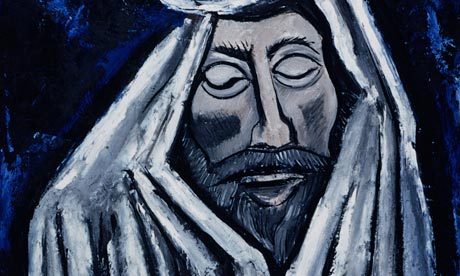
He always played around with form. Ben Jonson hated the way he toyed with metre - "Donne, for not keeping of accent, deserved hanging," but that's just one of the ways in which Jonson failed quite to understand what was important. When Donne wanted to be – as in most of his poems about love and sexuality – he could draw upon a technique as smooth as silk; in the Holy Sonnets, on which we shall be spending most of this series, he clearly felt that he needed to make it clear that some things are more important than strict form or rhythm. When souls are at stake, his soul in particular, what price correctness?
To put it another way, as a contemporary poet, which matters more? Saying clearly what you mean to say, what you think of as important, or strict adherence to rules?
For Donne, it was the theology that mattered most, but it might have been the same had it been the art. And, if we look at the poems, it's clear that sometimes he makes the abrasive choice, goes with the rough and urgent when he had the option of something smoother.
Take this, for example:
Batter my heart, three-person'd God, for you
As yet but knock, breathe, shine, and seek to mend;
That I may rise and stand, o'erthrow me, and bend
Your force to break, blow, burn, and make me new.
I, like an usurp'd town to another due,
Labour to admit you, but oh, to no end;
Reason, your viceroy in me, me should defend,
But is captiv'd, and proves weak or untrue.
Yet dearly I love you, and would be lov'd fain,
But am betroth'd unto your enemy;
Divorce me, untie or break that knot again,
Take me to you, imprison me, for I,
Except you enthrall me, never shall be free,
Nor ever chaste, except you ravish me.
Some of the extra syllables in lines can be elided, as you read, with no loss of sense; others deliberately throw off any reading for music rather than powerful rhetoric. Donne meant what he said, and he knew that the music was there, even if it broke for a second. This is why this particular poem has been set twice, and impressively, by modern composers – Britten in his selection of the Holy Sonnets pretty much straightforwardly and passionately, and John Adams, in his Oppenheimer opera Doctor Atomic, rather more brutally, and chopping the text around. In another context, which we will come to later in this series, Donne talked of his hope of heaven as being "made thy [ie, God's] music" – whatever the truth of that, other artists have done him proud.
What's the important thing about this poem that we can learn from it, whatever our beliefs? That the struggle to determine what we think so often takes place in liminal states, and in paradox and oxymoron. Donne will play games with broken structure, to make a serious point; he will pile up metaphors to talk to us of how faith, how conversion to faith or some other conviction, is a breaking, is like moving into a new state where everything is up for grabs. It is like Æsop's man with a coat whom the wind and sun contend over, using maximum and minimum effort to get their way; it is like a town under siege and betrayed and misruled – this in an age where the rules of war were about to become quite staggeringly brutal; it is like gender change, the breaking of betrothal and rape. Donne's analogy between conversion and all of these things could seem trivialising, but that fierce urgency makes them powerful statements of psychological truth beyond his religious beliefs.
To start to believe in something passionately, that you did not consider seriously before, hurts. That is a truth, beyond religion and God.

